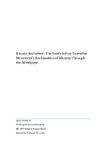Rāvaṇa Reclaimed: The South Indian Dravidian Movement's Reclamation of Identity Through the Rāmāyaṇa (thesis)

View/
Author
Austin, Emily A.
Subject
Washington and Lee University -- Honors in Religion
Rāmāyaṇa (Vālmīki)
Politics and government
Dravidian movement
India
Metadata
Show full item recordDescription
Thesis; [FULL-TEXT FREELY AVAILABLE ONLINE] Emily A. Austin is a member of the Class of 2018 of Washington and Lee University. The Rāmāyaṇa proves itself to be an inimitable and lasting artifact of cultural measurement. The variety of interpretations, filled with intertextual complexity and culturally-specific commentary as well as surrounding polemic discussions, serve to highlight and perpetuate norms of civilization and specifics of religion as the narrative was passed among many areas. Transmission through trade, conversion, conquest, and artistic productions catapulted the Rāmāyaṇa all over Asia, but notably from North India to South India. This thesis examines the differences in retellings of the Rāmāyaṇa from the North – Valmīki’s text – and in the South – through Kampaṉ’s Tamil language text as well as a few modern South Indian retellings – to see how the Rāmāyaṇa is actively applied as a tool of either oppression or resistance. Through the recharacterization of several characters and narrative events, this thesis examines the importance of representation and autonomy in the Rāmāyaṇa as it relates to how religious literature can be used as a tool of ideology. I include literary analysis and comparison, investigation of political movements and key figures – centered around the encompassing Dravidian Movement – and nuanced discussions of dharma and its implications in order to show how the Dravidian Movement uses the Rāmāyaṇa to reconstruct a political and historical identity in opposition to a Brahmanical North Indian cultural hegemony.